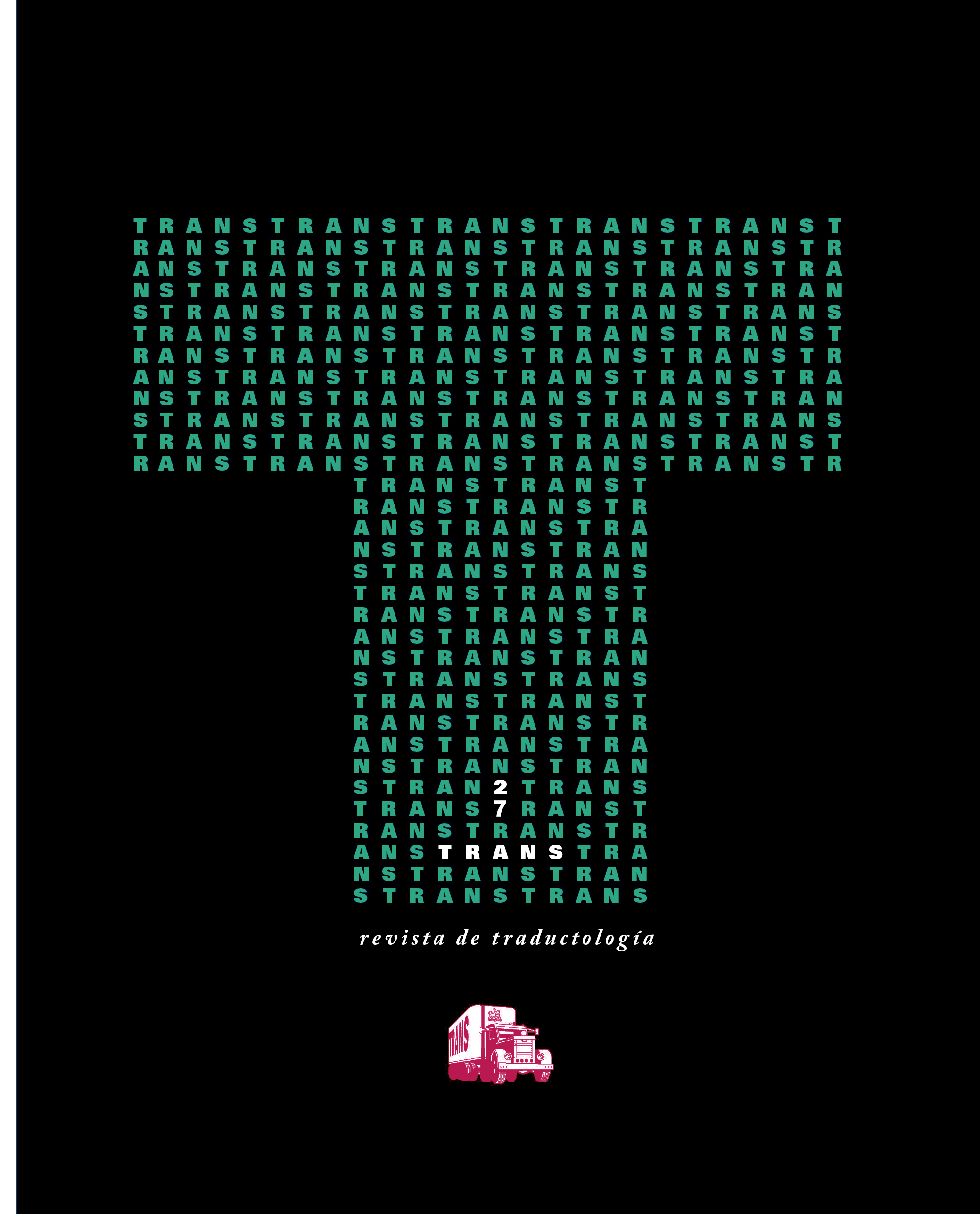Maria Edgeworth’s Arrival in Galician Literature: O castelo Rackrent (2022)
DOI:
https://doi.org/10.24310/trt.27.2023.16000Keywords:
Maria Edgeworth, Castle Rackrent, Anglo-Irish literature, literary translation, Galician literatureAbstract
Since its publication in 1800, Castle Rackrent became Maria Edgeworth’s best and most cherished work. It inaugurated the Big House Novel and turned into a reference for many European authors that came later. Nevertheless, and despite being translated into several languages during the nineteenth and twentieth centuries, it was not until the 2020s that Edgeworth’s narratives were rendered into Galician. This paper analyzes the recent translation of Castle Rackrent as O castelo Rackrent using Itamar Even-Zohar’s polysystem theory and Gerard Genette’s approach to paratexts as the theoretical framework. After a brief contextualization of Edgeworth and Castle Rackrent, I examine the main features of the target text and its impact in Galician literature.
Downloads
Metrics
Publication Facts
Reviewer profiles N/A
Author statements
Indexed in
-
—
- Academic society
- N/A
- Publisher
- Universidad de Málaga
References
Barbé i Durán, L. (2002). Retrato de familia sobre fondo de tréboles. Muchnik.
Butler, M. (1972). Maria Edgeworth: A Literary Biography. Clarendon Press.
Butler, M. (2001). Edgeworth’s Ireland: History, Popular Culture and Secret Codes. Novel 34 (2), 267-92.
Cochran, K. (2001). The Plain Round Tale of Faithful Thady: Castle Rackrent as Slave Narrative. New Hibernia Review 5(4), 57-72.
Constenla Bergueiro, G. (2013). Evolución das traducións ao galego: das orixes ao século XXI. In X. M. Mosquera Carregal (Ed.). Lingua e tradución: IX Xornadas sobre Lingua e Usos (pp. 83-100). Universidade da Coruña.
Cronin, J. (1980). The Anglo-Irish Novel. Vol I. Apletree Press.
Edgeworth, M. (1800). Castle Rackrent. Third edition. Johnson.
Edgeworth, M. (1802a). Traits remarquables des moeurs des Irlandais. (Tirés du Glossary du Château de Rackrent, par Miss Edgeworth). Bibliothèque Britannique. Littérature 19(2), 268-88.
Edgeworth, M. (1802b). Schloss Rackrent. Eine Erzählung aus den Jahbüchern Irlands vor der Union, aus dem Englischen von George Cooper, Esq. Keyser.
Edgeworth, M. (1957). Meine hochgeborene Herrschaft. Castle Rackrent. Aus dem Englischen übersetzt von Lore Krüger. Aufbau-Verlag.
Edgeworth, M. (1964). Château Rackrent. Préface et traduction par Pierre Leyris. Mercure de France.
Edgeworth, M. (1996). El castiellu la Rentona. Trans. Milio Rodríguez Cueto. VTP.
Edgeworth, M. (2000). The Absentee. Trans. M. Salís y A. Canosa. Alba Editorial.
Edgeworth, M. (2004). El castillo Rackrent. Trans. Betty Curtis. Littera Books, S.L.,
Edgeworth, M. (2015). Ennui. Trans. Joan Eloi Roca. Ático Clásicos.
Edgeworth, M. (2019). Essay on the Noble Art of Self-Justification. Assaig sobre la noble ciència de l’autojustificació. Trans. Anna Brichs. Biblioteca Clássica del Núvol.
Edgeworth, M. (2020). Belinda. Trans. Noemí Jiménez Furquet. Libros de Seda.
Edgeworth, M. (2021). Leonora. Trans. Carmen María Fernández Rodríguez. Rinoceronte Editora. Colección Vétera.
Edgeworth, M. (2022). O castelo Rackrent. Trad. Alejandro Tobar. Hugín e Munin.
Even-Zohar, I. (1990a). The Literary Polysystem. Poetics Today 11, 9-46.
Even-Zohar, I. (1990b). The Position of the Translated Literature within the Literary Polysystem. Poetics Today 11, 45-51.
Genette, G. (1987). Seuils. Collection Poétique. Paris: Éditions du Seuil. Print.
Gómez, J. (2010). Mi tesis era simple: entrar en la cabeza de los gallegos. https://www.lavozdegalicia.es/noticia/cultura/2010/09/29/even-zohar-tesis-era-simple-entrar-cabeza-gallegos/0003_8752559.htm
Hollingworth, B. (1997). Maria Edgeworth’s Irish Writing: Language, History, Politics. Macmillan Press Ltd.
Kreilkamp, V. (1998). The Anglo-Irish Novel and the Big House. Syracuse University Press.
Leproni, Raffaella and Fantaccini, F. (Eds.) (2019). Still Blundering into Sense: Maria Edgeworth, her Context, her Legacy. Firenze University Press.
Luna Alonso, A. (2013). Análise da tradución literaria cara ao galegofitos e tendencias nos primeiros anos do século XXI. In X. M. Mosquera Carregal. Lingua e tradución: IX Xornadas sobre Lingua e Usos. (pp. 101-25). Universidade da Coruña.
Millán-Varela, C. (2000). Translation, Normalisation and Identity in Galician. Target. International Journal of Translation Studies, 128(2), 267-282.
Monteagudo. H. et al. (2020). La transmisión intergeneracional del gallego: Estrategias familiares de mantenimiento y convivencia. Hispanismes: Revue de la societé des hispanistes français 16, 1-25.
Nash, J. (2019). Introduction. Castle Rackrent . Ontario: Broadview Press.7-16.
O’Donnell, K. (2009). Castle Stopgap: Historical Reality, Literary Realism, and Oral Culture. Eighteenth-Century Fiction, 22(1), 115-130.
Toury, G. (1995). Descriptive Translation Studies and Beyond. John Benjamins.
Downloads
Published
How to Cite
Issue
Section
License
Copyright (c) 2023 Carmen Maria Fernández

This work is licensed under a Creative Commons Attribution-NonCommercial-ShareAlike 4.0 International License.
All contents published in TRANS. Revista de Traductología are protected under the Creative Commons Attribution-NonCommercial-ShareAlike 4.0 International (CC BY-NC-SA 4.0) license. All about this license is available in the following link: <http://creativecommons.org/licenses/by-nc-sa/4.0>
Users can copy, use, redistribute, share and exhibit publicly as long as:
- The original source and authorship of the material are cited (Journal, Publisher and URL of the work).
- It is not used for comercial purposes.
- The existence of the license and its especifications are mentioned.
- ShareAlike — If you remix, transform, or build upon the material, you must distribute your contributions under the same license as the original.
There are two sets of authors’ rights: moral and property rights. Moral rights are perpetual prerogatives, unrenounceable, not-transferable, unalienable, imprescriptible and inembargable. According to authors’ rights legislation, TRANS. Revista de Traductología recognizes and respects authors moral rights, as well as the ownership of property rights, which will be transferred to University of Malaga in open access.
The property rights are referred to the benefits that are gained by the use or the dissemination of works. TRANS. Revista de Traductología is published in an open access form and it is exclusively licenced by any means for doing or authorising distribution, dissemination, reproduction, , adaptation, translation or arrangement of works.
Authors are responsable for obtaining the necessary permission to use copyrighted images.













21.png)
